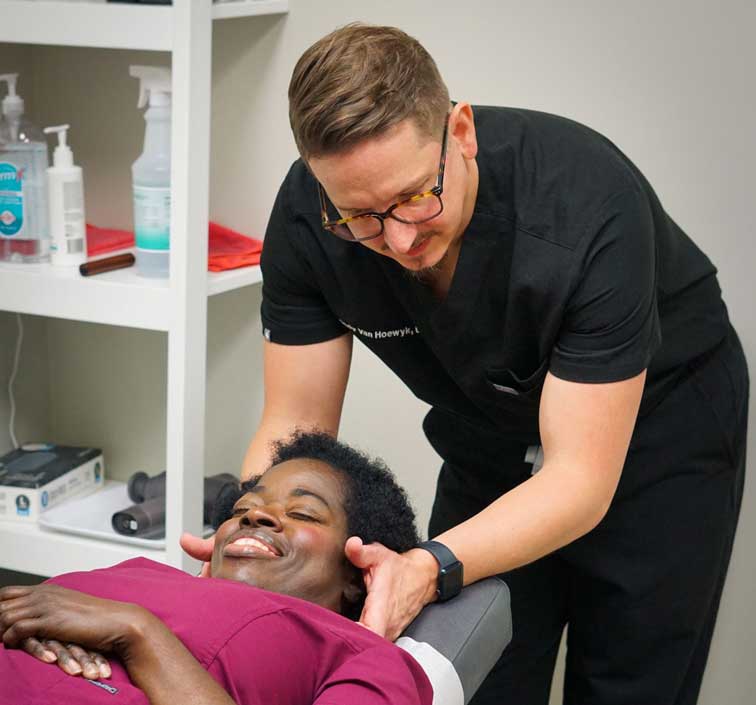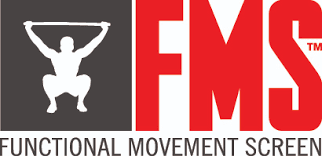
How does neck pain happen?
There are many types of neck pain. Most episodes of neck pain are not caused by serious health conditions, although some are or can indicate a deeper, underlying pathology.
Neck pain isn’t a new condition, although the causes of neck pain have changed tremendously in the last 20 years. The rise of computers and mobile devices and the ease of their accessibility has brought neck pain to the forefront of our attention, primarily due to the neck strain and muscle tension that comes with technology’s prolonged use.
Neck pain started long before the use of technology, however. “Tech neck,” the term for technology-related neck pain, used to be called “librarian’s headache” due to the long amounts of time a librarian would look down while reading a book or checking a paper file! Our lifestyles changed as technology evolved in the last few decades. Now, many of us spend a portion of the day looking down at laptop or cell phone screen, slouched in traffic, or collapsed on the couch after a challenging day of work. Neck pain is now commonplace.
Different types of neck pain
Tightness and discomfort in the neck can have a variety of causes ranging from stress and poor posture, injuries from traumas or accidents, degeneration of neck structures, pinched nerves, and congenital causes. Neck pain can also be the result of tightness or dysfunction of the head, shoulder, upper back, or even the lower back! Because of its interconnectedness with the rest of the body, neck pain can vary from person to person and is rarely a one-size-fits-all approach to fix.
So, how does the neck work and how is it prone to being hurt? Let’s review the neck’s anatomy briefly:
The neck is composed of seven blocky bones, called vertebrae, that run from the base of the skull to the top of your shoulders, along the spine. The neck is a complex structure of bones, muscles, ligaments, vessels, cartilage, and rubbery discs between almost every vertebra. This allows it to bend forward, extend back, lean from side to side, and rotate to look over our shoulders. A latticework of neck muscles connects the neck to the chest, upper shoulders, and upper back. In the front reside the throat structures, such as the trachea (windpipe) and esophagus.
When an injury occurs to the neck, whether it’s the result of an injury (trauma) or overuse (strain), any one of these structures can be impacted. This creates symptoms like:
- Aching in the neck and upper back
- Pain or numbness in the upper back or arms
- Tightness at the base of the skull
- Sharp, electric-like sensations down the arm
- Tightness in the sides of the neck into the shoulder
- Headaches
Does all neck pain feel the same?
Neck pain can vary from person to person and may have many causes. It’s important to consult a doctor if you have neck pain that doesn’t go away, or keeps returning for days or weeks at a time. Your doctor of chiropractic can help determine what is causing it and the best course of action to help.
Understanding your symptoms and when they began are key factors in determining possible causes for your neck pain. Neck pain that started from sleeping poorly (often felt as a “crick” or stiff ache in your neck) may have a different cause for discomfort than neck pain sustained from, say, a motor vehicle collision.
Different neck conditions cause different types of neck pain. Here are the most common sensations with neck pain and their causes:
Stiff, aching, or sore neck
Neck pain that feels like achy, tight, or stiff may be due to overactive muscles in the neck. This cause of neck pain often worsens toward the end of the day. This neck pain is experienced after prolonged periods of repetition like slouching, stressful posture, or mild injuries to the neck like a fender bender.
Tight neck that’s hard to move
This type of neck discomfort may have several causes. Neck pain that reduces range of motion can be experienced with muscle spasms, collision injuries, degeneration (wear and tear) from age, or injuries to the neck joints. Significant neck muscle tightness accompanied by fever and electric-like sensations into your arms should warrant a visit to your family physician.
Pinching sensations in the neck, shoulder, or arm
Sensations that feel electrical or “shooting” into the shoulder may indicate a nerve is pinched somewhere. Lots of nerves exit from our cervical spine (neck) and extend into the shoulder, upper back, and arm, even down into our hands and fingertips. You may feel tingling, pins-and-needles, or even numbness. Pinched nerves can be caused by disc herniations, muscle spasms and adhesions, joint or ligament inflammation, scar tissue, and other types of soft tissue injuries.
Other types of neck pain may come from m fractured vertebrae, referral pain from other organs (like heart or lungs), or even spinal cord injuries! Thankfully, these injuries are not common.
Do I need imaging for my neck pain?
A well-trained chiropractor can assess and treat mechanical, also known as musculoskeletal, conditions!
Imaging is not necessary for most types of neck pain. If your doctor orders imaging, they may order an x-ray to visualize harder structures like bones and joint spaces, an MRI to evaluate soft tissues like muscles and joints, or computed tomography (CT) to see connective tissue.
Who should I see to evaluate my neck pain?
If neck pain interferes with your ability to perform work, engage in your usual routines and leisure activities, it’s time to see a doctor. Talk with us office if you have concerns about neck pain — whether it’s sharp or dull, aching, severe, or just annoying, a chiropractor is the right doctor to see to evaluate your neck.
How we treat neck pain
At Cardinal Chiropractic and Sports Recovery, we take the time to get to know you. Pain is not easy to endure, and we strive to provide the most compassionate and effective forms of treatment.
After a thorough examination and diagnosis, if chiropractic care is not the right intervention for your pain, then we make the referral to another specialist, such as a neurologist, orthopedist, or pain management doctor.
If you or someone you know is suffering from neck pain, give our office a call to schedule an appointment rather than wait to see if the pain improves or goes away. Our chiropractic office has managed many people with neck pain with success, helping people live a healthier and pain-free life!
If you want a same-day appointment for your pain, call our office at 336-270-3050 or schedule online.
1 Bronfort G, et. al. Spinal Manipulation, Medication, or Home Exercises with Advice for Acute and Subacute Neck Pain. Ann. Intern. Med. 2012, 156: 1-10.




